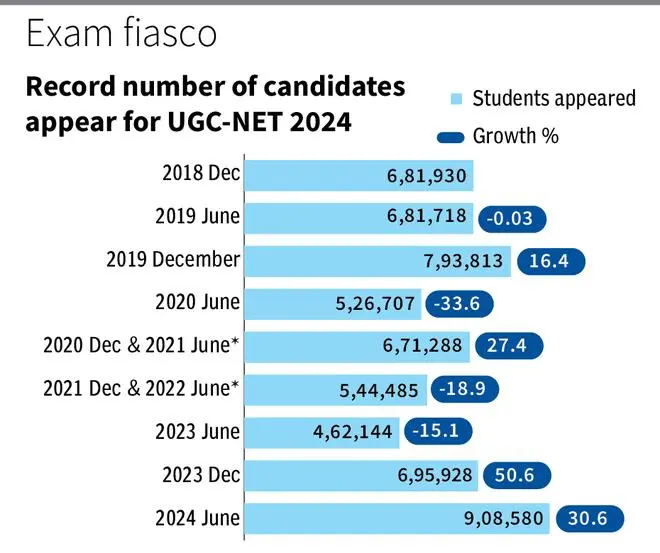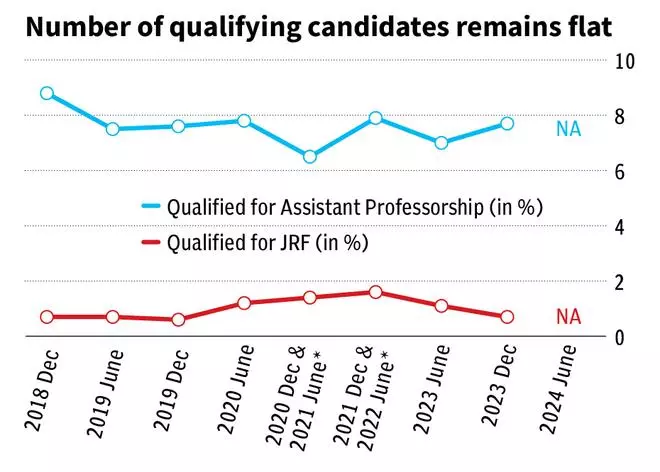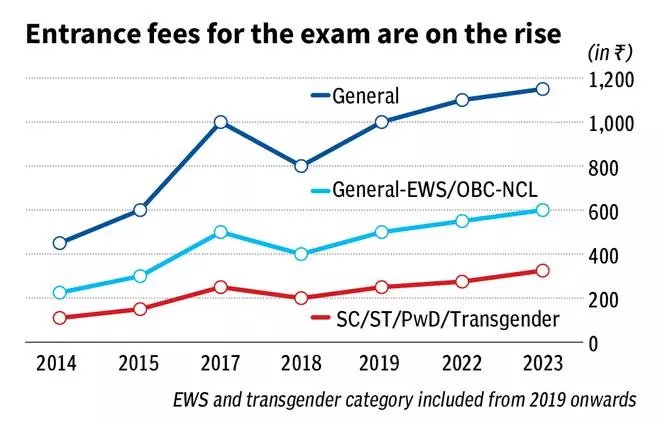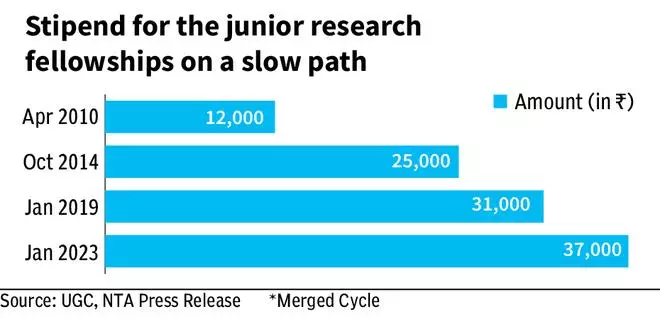The 2024 University Grants Commission’s National Eligibility Test (UGC-NET), which was cancelled earlier this week due to integrity issues, saw record-high candidates write the exam.
Conducted by the National Testing Agency (NTA), UGC-NET is the test for Junior Research Fellowship, appointment as Assistant Professors and admission to PhD degree courses. Official data shows that 9.08 lakh candidates appeared for the exam, representing a 30.6 per cent growth in the number of candidates appearing for the entrance test in comparison to last entrance cycle.
The entrance test was cancelled a day after students appeared for the exam. The Ministry of Education took this action following inputs from the Central government indicating that the entrance test paper had been leaked before the exam.

NTA as the nodal agency conducts entrance tests twice a year on behalf of the UGC for two positions. The results determine whether a student is qualified to teach as an assistant professor in a UGC-recognized Indian university, and identifies a qualified scholar who can receive a monthly stipend under the Junior Research Fellowship (JRF) for the period of two years during PhD program.

Data from the UGC website suggests that despite the large number of people appearing for the entrance test, only a small percentage manage to clear the cut-off marks and this has remained same over the years. In the June 2023 cycle, out of 4.6 lakh students who appeared, only seven per cent cleared the assistant professorship exam, and 1.1 per cent cleared the JRF exam. Similarly, in the December 2023 cycle, a record 6.9 lakh people appeared, with around 7.7 per cent clearing the assistant professorship exam and 0.7 per cent qualifying for the JRF exam.
Afroz Alam, head of the Department of Political Science at the Maulana Azad National Urdu University, said, “There are various factors for the rise in the number of applicants, such as increasing student enrolment ratio, more students pursuing post-graduation, and establishment of new universities. Consequently, students who complete their postgraduate studies often apply for the UGC-NET by default to advance their professional aspirations in academia.”
The UGC-NET entrance examination has witnessed a substantial difference between the number of people registering for the exam and those who actually appear for it. In the June 2024 cycle, 11.2 lakh individuals registered for the examination, yet 2.1 lakh of them did not appear. A similar trend was observed in the December 2023 cycle, where 9.4 lakh people registered, but 2.4 lakh did not take the test.

Data also shows that the entrance fees for the exam has been steadily rising across categories. For the General category, it was ₹450 in 2014, which increased to ₹1,000 in 2017, and was then hiked to ₹1,150 in 2023. For the Other Backward Class (OBC), it was ₹225 in 2014, increased to ₹500 in 2017, and is ₹600 in 2023. For Scheduled Castes, Scheduled Tribes, and others, the fee was ₹110 in 2014, increased to ₹250 in 2017, and further rose to ₹325 in 2023.
“It is a cause of concern that despite the examination being conducted on the OMR sheet, the fees have not been reduced. Until last year, the examination used to take place only on computers,” Jawaharlal Nehru University Students Union President Dhananjay said.
“We protested yesterday in front of the Ministry of Education premises, and we are continuing our protest today on campus, too against the controversy,” he added.
The paper leak and subsequent cancellation of the exam has resulted in widespread hardship for the candidates as it involves significant time and cost of commuting to the test centre.

The stipends for JRF have also not kept pace with inflation. Since January 2023, JRFs have been entitled to a stipend of ₹37,000 and this represents a Compound Annual Growth Rate (CAGR) of 9.05 per cent over a 13-year period from 2010.
“The fellowship that JRF scholars receive is very minimal, especially considering that research costs in India are increasing. If the fellowship does not provide adequate support, it can negatively impact the quality of research conducted by scholars,” added Alam.
Dhananjay said, “Scholars who qualify for the JRF often do not receive their stipend on time, which can take 2-3 months. Additionally, the registration process for JRF in respective universities is a lengthy bureaucratic process that affects students opting for PhD programs in universities.”





Comments
Comments have to be in English, and in full sentences. They cannot be abusive or personal. Please abide by our community guidelines for posting your comments.
We have migrated to a new commenting platform. If you are already a registered user of TheHindu Businessline and logged in, you may continue to engage with our articles. If you do not have an account please register and login to post comments. Users can access their older comments by logging into their accounts on Vuukle.